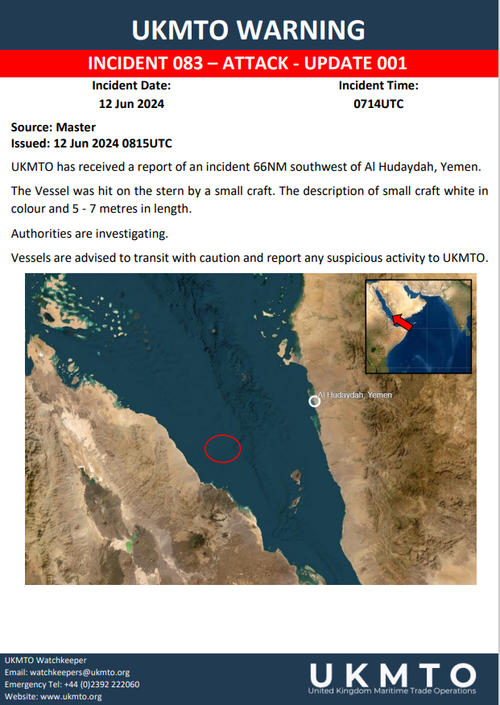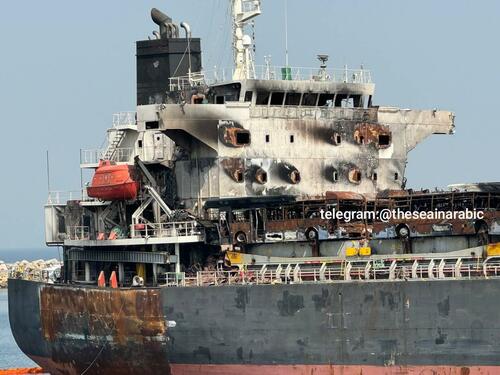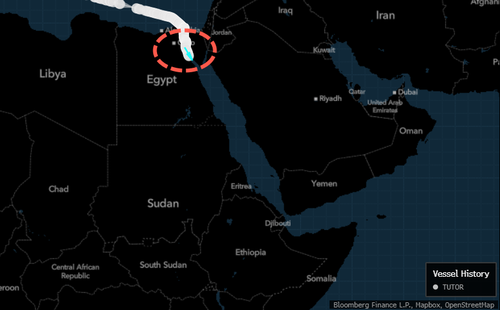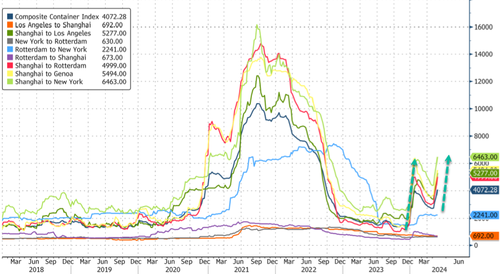
Yemen's Houthi movement might have expanded its weapon arsenal by attacking a bulk carrier in the Red Sea with a suicide drone boat (the first time in this conflict). This marks a shift from the terror group's usual anti-ship ballistic missiles and or kamikaze aerial drones.
On X, the British military's United Kingdom Maritime Trade Operations said, "The vessel was hit on the stern by a small craft" about 66 nautical miles southwest of Al Hudaydah, Yemen.
Bloomberg said the commodity-hauling bulk carrier is called "Tutor." Ship tracking data shows the vessel switched off its Automatic Identification System late last week after entering the Suez Canal.
Maritime security company Diaplous said a suicide drone boat hit Tutor, adding the vessel's engine compartment was taking on water.
There is no confirmation if Houthi rebels carried out the attack. However, the terror group has been on a half-year rampage across major shipping lanes in the Red Sea and Gulf of Aden, attacking Western-linked vessels with missiles and drones.
According to an International Maritime Organization document obtained by the Middle East Eye, Houthi rebels have attacked 28 bulk carriers, tankers, container ships, cargo ships, and crude oil tankers.
Nine of the vessels were Marshall Island-flagged and three were US-flagged. Others were from Malta, Barbados, Panama, Belize, Greece, Palau, Liberia, Singapore, and Portugal.
On Monday, new images published on social media showed missile attack damage to the previously owned US bulk carrier "True Confidence" from March 6.

These attacks have snarled global supply chains and sent containerized shipping costs soaring in recent months.
Next up is US CENTCOM responding to the incident. They usually do not comment on the specific weapons used and often say "projectile." This report of the attack should be out this evening or tomorrow morning.
Furthermore, this won't be the last time Houthi rebels use suicide boats against commercial vessels linked to the West in the Red Sea and or the Gulf of Aden. The group has also warned about expanding its threat coverage into the Mediterranian Sea.
Yemen’s Houthi movement might have expanded its weapon arsenal by attacking a bulk carrier in the Red Sea with a suicide drone boat (the first time in this conflict). This marks a shift from the terror group’s usual anti-ship ballistic missiles and or kamikaze aerial drones.
On X, the British military’s United Kingdom Maritime Trade Operations said, “The vessel was hit on the stern by a small craft” about 66 nautical miles southwest of Al Hudaydah, Yemen.
Bloomberg said the commodity-hauling bulk carrier is called “Tutor.” Ship tracking data shows the vessel switched off its Automatic Identification System late last week after entering the Suez Canal.
Maritime security company Diaplous said a suicide drone boat hit Tutor, adding the vessel’s engine compartment was taking on water.
There is no confirmation if Houthi rebels carried out the attack. However, the terror group has been on a half-year rampage across major shipping lanes in the Red Sea and Gulf of Aden, attacking Western-linked vessels with missiles and drones.
According to an International Maritime Organization document obtained by the Middle East Eye, Houthi rebels have attacked 28 bulk carriers, tankers, container ships, cargo ships, and crude oil tankers.
Nine of the vessels were Marshall Island-flagged and three were US-flagged. Others were from Malta, Barbados, Panama, Belize, Greece, Palau, Liberia, Singapore, and Portugal.
On Monday, new images published on social media showed missile attack damage to the previously owned US bulk carrier “True Confidence” from March 6.

These attacks have snarled global supply chains and sent containerized shipping costs soaring in recent months.
Next up is US CENTCOM responding to the incident. They usually do not comment on the specific weapons used and often say “projectile.” This report of the attack should be out this evening or tomorrow morning.
Furthermore, this won’t be the last time Houthi rebels use suicide boats against commercial vessels linked to the West in the Red Sea and or the Gulf of Aden. The group has also warned about expanding its threat coverage into the Mediterranian Sea.
Loading…







